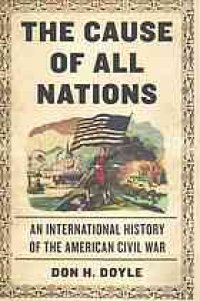
Ebook: The cause of all nations : an international history of the American Civil War
Author: Doyle Don Harrison
- Tags: United States -- History -- Civil War 1861-1865 -- Foreign public opinion. United States -- Foreign relations -- 1861-1865. United States -- History -- Civil War 1861-1865 -- Influence. International relations -- History -- 19th century. World politics -- 19th century. United States -- Politics and government -- 1861-1865. HISTORY / United States / Civil War Period (1850-
- Year: 2015
- Publisher: Basic Books
- City: Array
- Edition: First edition
- Language: English
- epub
Abstract: "When Abraham Lincoln delivered the Gettysburg Address in 1863, he had broader aims than simply rallying a war-weary nation. Lincoln realized that the Civil War had taken on a wider significance-that all of Europe and Latin America was watching to see whether the United States, a beleaguered model of democracy, would indeed 'perish from the earth.' In The Cause of All Nations, distinguished historian Don H. Doyle explains that the Civil War was viewed abroad as part of a much larger struggle for democracy that spanned the Atlantic Ocean, and had begun with the American and French Revolutions. While battles raged at Bull Run, Antietam, and Gettysburg, a parallel contest took place abroad, both in the marbled courts of power and in the public square. Foreign observers held widely divergent views on the war-from radicals such as Karl Marx and Giuseppe Garibaldi who called on the North to fight for liberty and equality, to aristocratic monarchists, who hoped that the collapse of the Union would strike a death blow against democratic movements on both sides of the Atlantic. Nowhere were these monarchist dreams more ominous than in Mexico, where Napoleon III sought to implement his Grand Design for a Latin Catholic empire that would thwart the spread of Anglo-Saxon democracy and use the Confederacy as a buffer state. Hoping to capitalize on public sympathies abroad, both the Union and the Confederacy sent diplomats and special agents overseas: the South to seek recognition and support, and the North to keep European powers from interfering. Confederate agents appealed to those conservative elements who wanted the South to serve as a bulwark against radical egalitarianism. Lincoln and his Union agents overseas learned to appeal to many foreigners by embracing emancipation and casting the Union as the embattled defender of universal republican ideals, the "last best hope of earth." A bold account of the international dimensions of America's defining conflict, The Cause of All Nations frames the Civil War as a pivotal moment in a global struggle that would decide the survival of democracy. "--
"The Civil War is most often understood as an internal conflict, one fought by American soldiers over issues uniquely American in origin and consequence. But in The Cause of All Nations, distinguished historian Don H. Doyle reframes our understanding of the Civil War, describing it as a conflict that was shaped by international forces--and which had major international repercussions. Doyle shows that, rather than being an internal struggle, the Civil War hinged on the support of nations across the seas, especially in Europe. Both the North and the South looked to Europe for backing, and the Confederacy in particular depended on Britain and France recognizing it as a legitimate nation, which would allow for commercial treaties, loans, and even military aid. Indeed, representatives of the North and the South went so far as to adapt their ideologies to the expectations of European leaders, in the hopes of garnering much-needed support; at a certain point late in the war, the Confederacy even considered abolishing slavery in an attempt to win over French and British rulers. Lincoln quickly learned to reframe the Union's argument in order to win over potential allies. Instead of framing the debate around the unconstitutionality of the South's secession, his speeches began to highlight the importance of preserving the Union and freeing the slaves, an approach with allowed Lincoln to win the support of the European public. The United States became the 'Great Republic,' an embattled defender of liberty, equality, and self-government and, in Lincoln's poignant words, the 'last best hope of earth.' A bold account of the international dimensions of one of America's most defining conflicts, The Cause of All Nations offers an important new way of understanding the Civil War"